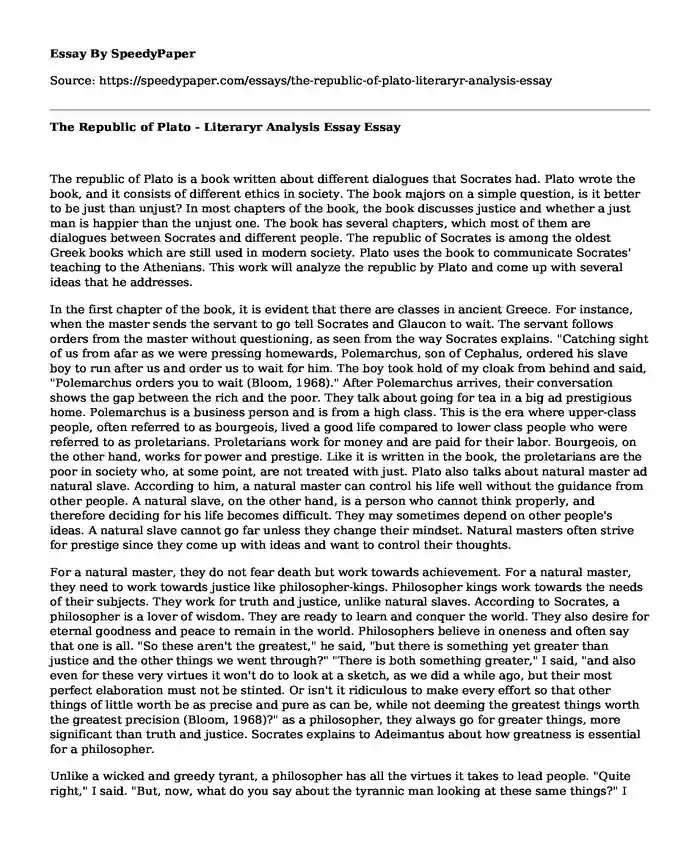
| Type of paper: | Literature review |
| Categories: | Literature Ethics Books Plato |
| Pages: | 4 |
| Wordcount: | 829 words |
The republic of Plato is a book written about different dialogues that Socrates had. Plato wrote the book, and it consists of different ethics in society. The book majors on a simple question, is it better to be just than unjust? In most chapters of the book, the book discusses justice and whether a just man is happier than the unjust one. The book has several chapters, which most of them are dialogues between Socrates and different people. The republic of Socrates is among the oldest Greek books which are still used in modern society. Plato uses the book to communicate Socrates' teaching to the Athenians. This work will analyze the republic by Plato and come up with several ideas that he addresses.
In the first chapter of the book, it is evident that there are classes in ancient Greece. For instance, when the master sends the servant to go tell Socrates and Glaucon to wait. The servant follows orders from the master without questioning, as seen from the way Socrates explains. "Catching sight of us from afar as we were pressing homewards, Polemarchus, son of Cephalus, ordered his slave boy to run after us and order us to wait for him. The boy took hold of my cloak from behind and said, "Polemarchus orders you to wait (Bloom, 1968)." After Polemarchus arrives, their conversation shows the gap between the rich and the poor. They talk about going for tea in a big ad prestigious home. Polemarchus is a business person and is from a high class. This is the era where upper-class people, often referred to as bourgeois, lived a good life compared to lower class people who were referred to as proletarians. Proletarians work for money and are paid for their labor. Bourgeois, on the other hand, works for power and prestige. Like it is written in the book, the proletarians are the poor in society who, at some point, are not treated with just. Plato also talks about natural master ad natural slave. According to him, a natural master can control his life well without the guidance from other people. A natural slave, on the other hand, is a person who cannot think properly, and therefore deciding for his life becomes difficult. They may sometimes depend on other people's ideas. A natural slave cannot go far unless they change their mindset. Natural masters often strive for prestige since they come up with ideas and want to control their thoughts.
For a natural master, they do not fear death but work towards achievement. For a natural master, they need to work towards justice like philosopher-kings. Philosopher kings work towards the needs of their subjects. They work for truth and justice, unlike natural slaves. According to Socrates, a philosopher is a lover of wisdom. They are ready to learn and conquer the world. They also desire for eternal goodness and peace to remain in the world. Philosophers believe in oneness and often say that one is all. "So these aren't the greatest," he said, "but there is something yet greater than justice and the other things we went through?" "There is both something greater," I said, "and also even for these very virtues it won't do to look at a sketch, as we did a while ago, but their most perfect elaboration must not be stinted. Or isn't it ridiculous to make every effort so that other things of little worth be as precise and pure as can be, while not deeming the greatest things worth the greatest precision (Bloom, 1968)?" as a philosopher, they always go for greater things, more significant than truth and justice. Socrates explains to Adeimantus about how greatness is essential for a philosopher.
Unlike a wicked and greedy tyrant, a philosopher has all the virtues it takes to lead people. "Quite right," I said. "But, now, what do you say about the tyrannic man looking at these same things?" I "That he is by far," he said, "the most wretched of all men." From the quote, Glaucon tells Socrates how tyrant men are wretched and not care about other people. Poetry and philosophy go hand in hand as Socrates explains how he used music in some areas of his teaching.
In conclusion, the republic of Plato dramatically assists in understanding different conversations of Plato with different some, which are mentioned in the paper. The book talks about justice and righteousness and also tyranny among different individuals. For Socrates, it is better to be just so that we can live a better life than be a tyrant. The book also talks about examples of good and evil through his dialogues with individuals such as Glaucon. Plato uses the dialogues of Socrates to teach justice ad truthfulness to the people of his society. The book greatly informs people of a philosopher's life and the difference between a natural slave and a natural master.
References
Bloom, A. (1968). Interpretive essay. The republic of Plato, 2, 307-436.
Cite this page
The Republic of Plato - Literaryr Analysis Essay. (2023, Oct 15). Retrieved from https://speedypaper.net/essays/the-republic-of-plato-literaryr-analysis-essay
Request Removal
If you are the original author of this essay and no longer wish to have it published on the SpeedyPaper website, please click below to request its removal:
- Ancient Ethics - Essay Example in Philosophy
- Literary Essay Example on The Lottery by Shirley Jackson
- Of Mice and Men: American Dreams. Free Essay Sample
- Essay Sample on Love Stories
- Free Essay. Moana and the Princesses' Evolution
- Fire in the Southwest Proposal - Essay Sample
- Essay Sample on Ethical Case Analysis Paper
Popular categories




